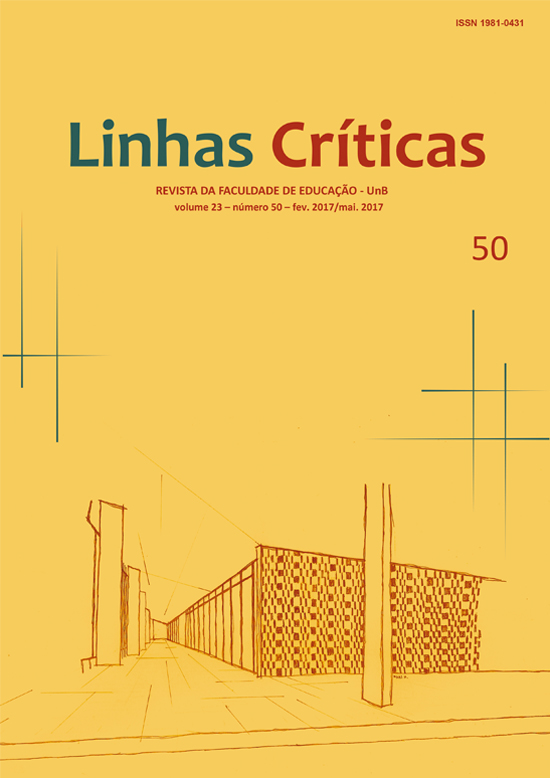Prince mirror: reflections from the Manual of Dhuoda
DOI:
https://doi.org/10.26512/lc.v23i50.5066Keywords:
History of medieval education, Dhuoda, Prince mirror, Authority, LeaderAbstract
We present a study of the Dhuoda Manual (nineteenth century), seen by scholars as the work prince mirror, a literary genre whose aim was to present a proposal for a moral, political and religious to the young people of that period. With this perspective, this study lies in the field of Medieval History of Education, aiming to reflect on this literary genre as a relevant element in the formation of the Christian nobleman. From this perspective, we reflect the sense of authority and leadership; We will place the historical context and the formulations contained in Dhuoda Manual, explaining to what extent its proposal follows the premises of this literary genre.
Downloads
References
AQUINO, Júlio Groppa. A violência escolar e a crise da autoridade docente. Caderno CEDES, vol.19, n.47. Campinas: dez. 1998, p. 1-13. Disponível em: <http://www.scielo.br/scielo.php?script=sci_arttext&pid=S0101-32621998000400002>. Acesso em: 19 abr. 2016.ARENDT, Hannah. A crise na Educação(1961). Disponível em: <http://www.gestaoescolar.diaadia.pr.gov.br/arquivos/File/otp/hanna_arendt_crise_educacao.pdf>. Acesso em: 19 abr. 2016.
BLOCH, Marc. Apologia da História ou o ofício de historiador. Rio de Janeiro: Zahar, 2001.
CALVINO, Ãtalo. Porque ler clássicos? São Paulo: Companhia das Letras, 1993.
SÃO BOAVENTURA. As seis asas do Serafim. In: Obras Escolhidas. Org. L. A. DE BONI. Caxias do Sul: Livraria Sulina Editora, 1985.
COSTA, Ricardo. O Espelho de Reis de Frei Álvaro Pais (c. 1275-1349) e seu conceito de tirania. In: MALEVAL, Maria do Amparo Tavares (Org.). Atas do III Encontro Internacional de Estudos Medievais. Rio de Janeiro: Editora Ágora da Ilha, 2001, p. 338-344. Disponível em: <http://www.ricardocosta.com/artigo/o-espelho-de-reis-de-frei-alvaro-pais-c-1275-1349-e-seu-conceito-de-tirania>. Acesso em: 19 abr. 2016.
DHUODA. La Educación cristiana de mi hijo. Pamplona: Editora Eunate, 1995.
LAUAND, Luiz Jean. (Or g.). Educação, teatr o e matemática medievais. S ão Paulo : Perspectiva, 1986.
LE GOFF , Jacques. Mercadores e banqueiros da Idade Média. Lisboa: Gradiva , 1991.
MAGNE, Augusto. O m ais antigo documento da L íngua Francesa: ensaios s obre a parte francesa dos Juramentos de 842. Petrópolis: Vozes
MERI NO , Merino. Introduçã o. In: DHUODA. La Educ ación cristiana de mi hijo. Pamplona: Editora Eunate, 1995.
NUNES, Ruy. O dever d a fidelidade no manual de Dhuoda. In: SOUZA, J. A. C. R. (Org.). O reino e o sacerdócio: o pensamento político na Alta Idade Média. Porto Alegre: EDI PUCRS,
PERNOUD, Régine. A mulher no tempo das catedrais. Lisboa: Gradiva, 1984.
RICHÉ, Pierre. Intr odução. In: DHUODA. Manuel pour mon fils. Paris: Sources Chrétiennes, 19
SAN AGUSTÃN. Enarraciones sobre los salmos. Ma drid: MCMLXIV, 1964. Disponível em: <http://pt.scribd.com/d oc/97953175/San-Agustin-20-Narraciones-sobre-los-salmos-2>. Acesso em: 19 abr. 2016.
Downloads
Published
How to Cite
Issue
Section
License
Copyright (c) 2017 Linhas Críticas

This work is licensed under a Creative Commons Attribution 4.0 International License.
Authors who publish in this journal agree to the following terms:
-Authors maintains the copyright and grants the journal the right of first publication, the work being simultaneously licensed under the Creative Commons Attribution License which allows the sharing of the work with recognition of the authorship of the work and initial publication in this journal.
- Authors are authorized to enter into additional contracts separately, for non-exclusive distribution of the version of the work published in this journal (eg publish in institutional repository or as a book chapter), with acknowledgment of authorship and initial publication in this journal.
-Authorers are allowed and encouraged to publish and distribute their work online (eg in institutional repositories or on their personal page) at any point before or during the editorial process, as this can generate productive changes as well as increase the impact and the citation of published work (See The Effect of Free Access).



